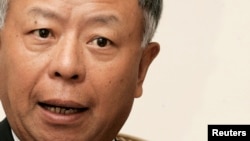China’s ability to rally 57 countries to join its new $100 billion Asian Infrastructure Investment Bank (AIIB) has been seen widely as a major victory for the country. But now the real work begins: the task of getting the bank up and running before the end of the year and analysts are not downplaying the huge challenges that lie ahead.
In the short space of six months, the bank has seen its slate of founding members more than double from 21 initial members. The final list of founders that was announced April 15 includes countries from the Middle East, South America, Europe, Africa and Asia.
The United States and Japan have refused to join citing concerns about the bank’s transparency and fair governance as well as its ability to uphold high environmental and labor standards. But as the number of members grew in recent weeks, with many of the United States allies stepping up to join, the focus has shifted more to ways U.S. and Japan led financial institutions such as the International Monetary Fund and Asian Development Bank could cooperate with the new global bank.
Development Shortfall
A key aim of the bank is to help meet Asia’s massive $800 billion need annually for highways, railways, ports, telecommunications, energy and electricity projects.
Besides the difficulties associated with carrying out expensive and massive infrastructure projects in developing countries, the bank also must determine how it will share responsibilities among its members.
Members expect to have a stake in the institution’s work that is equal to the share of money they invest.
It is unclear just how many of the projects will go to Chinese firms, which are eager to find projects overseas as China’s economy cools at home. According to financial magazine Caijing, the jockeying for positions of leadership within the bank has already begun among founding members.
The rules for how the bank will be governed are still being worked out. Chinese state media have said they will be finalized at meetings next month.
China will certainly want to keep enough of the total ownership to maintain a predominate voice in decision making, said economist Barry Naughton.
“We can expect they'll have probably at a minimum say 25 to 30 percent, which would be enough generally to give them the dominant voice,” he said. “But at the same time it's unlikely they will have more than that and so they will have to listen to and coordinate with other founding members of the bank.”
Dominate or Coordinate
China has said no country will have veto power at the bank, but also that the interests of members in the region will come first to ensure that they have a full voice in its operations.
According to state media reports, nearly 75 percent of the bank’s authorized capital of $100 billion will come from countries in Asia, such as South Korea, China and Australia, while the remaining portion will come from those outside of the region such as Britain, Germany and Brazil, according to state media reports.
AIIB secretary general Jin Liqun has said this does not mean China will dominate the bank’s decision making. Speaking at a development forum in Beijing last month, Jin said that as the bank’s biggest shareholder, China will have no special privileges, but instead will have responsibility in ensuring the bank’s success.
“China will follow existing international standards and will not behave like a big boss,” he said. “It will instead work with other members on an equal footing to reach agreement on decisions through negotiations and not rely on the authority of veto power to make decisions.”
China’s establishment of the bank has been seen by some as a challenge to existing U.S.-dominated institutions such as the International Monetary Fund and World Bank or the Asian Development Bank. And because of that some argue that is the reason why the United States and Japan refused to join.
China has said it is not trying to replace other institutions.
Economist Barry Naughton said that China would like the world to see the regional bank as adding to global infrastructure.
“But also, have it available as a tool for them, where they maintain a kind level of ultimate control, but its exercised in a soft fashion that increases China’s soft power,” he said, adding that while that's their objective the effort might fail or go off the tracks.
Risks and Opportunities
China is the world’s second largest economy and a rising force in global affairs. It has the money and experience in building infrastructure and if the bank succeeds in making a contribution to the region’s connectivity and prosperity it could bring huge benefits to Beijing.
But that opportunity to play a constructive role is not without its risks, said Peking University political scientist Jia Qingguo.
“China lacks experience in building international financial institutions and organizations and has much to learn,” Jia said. “If it succeeds it will reap benefits. If not, it will be very difficult.”
Jia adds that ensuring quality of projects and balancing relations with all of the founding members will also be a big challenge. And that includes making sure they too are reaping benefits and have a voice in its operations, he said.
A recent commentary in the Beijing-based Economic Observer noted that while China’s establishment of a broadly representative and inclusive bank is worth celebrating, the challenges have just begun.
The article noted that as time goes on, AIIB’s novelty will fade and increasingly its success will be based more on what it does and how it is resolving Asia’s difficult challenges.




